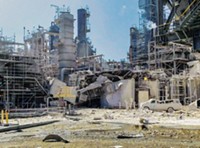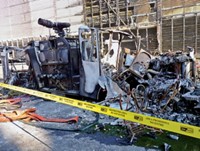Advertisement
Grab your lab coat. Let's get started
Welcome!
Welcome!
Create an account below to get 6 C&EN articles per month, receive newsletters and more - all free.
It seems this is your first time logging in online. Please enter the following information to continue.
As an ACS member you automatically get access to this site. All we need is few more details to create your reading experience.
Not you? Sign in with a different account.
Not you? Sign in with a different account.
ERROR 1
ERROR 1
ERROR 2
ERROR 2
ERROR 2
ERROR 2
ERROR 2
Password and Confirm password must match.
If you have an ACS member number, please enter it here so we can link this account to your membership. (optional)
ERROR 2
ACS values your privacy. By submitting your information, you are gaining access to C&EN and subscribing to our weekly newsletter. We use the information you provide to make your reading experience better, and we will never sell your data to third party members.
Safety
CSB Steps Back From ‘Safety Case’ Regulation Scheme
by Jeff Johnson
May 12, 2014
| A version of this story appeared in
Volume 92, Issue 19
In its final report on the causes of the 2010 Tesoro refinery explosion in Anacortes, Wash., that killed seven workers, the Chemical Safety & Hazard Investigation Board (CSB) has removed its draft recommendations for a new “safety case” regulatory scheme for U.S. refineries. A safety case approach is used in several countries and requires companies to work with regulators to develop regulatory requirements. Once developed, the performance-based regulatory system is overseen by government regulatory inspectors. The safety case was a key part of earlier draft recommendations, but two of CSB’s three current members opposed it, as did employers and the United Steelworkers Union. The final report, which unanimously cleared the board on May 1, recommends that inherently safer systems analysis be required whenever possible and calls for several process safety improvements. It also notes that CSB is still considering a safety case approach in some of its ongoing investigations. The actual causes of the Tesoro accident—piping corrosion and Tesoro safety failures—remain as stated in earlier drafts.




Join the conversation
Contact the reporter
Submit a Letter to the Editor for publication
Engage with us on Twitter